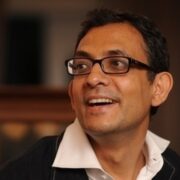
Chair holder of the Development Methodologies Chair
The Development Methodologies Chair was created by Agence française de développement (AFD), Paris Sciences et Lettres (PSL) and the Paris School of Economics. The main goal of this chair is to promote research in development economics in order to shine light on public policies in development, and particularly French policy.
Since the end of the 1990s, Esther Duflo and Abhijit Banerjee have made crucial contributions to a current trend in development economics that focuses on reducing poverty using a new methodological approach called RCTs (Randomised Controlled Trials) – experimental field studies designed to better inform decision makers about which public policies to adopt. This approach, which Duflo and Banerjee have popularised, has since become indispensable in development economics, and in 2019, they were awarded the Nobel prize in economics.
The research work of the chair aims to explore four areas of commitment in AFD’s Strategic Orientation Plan (SOP):
In doing so, the research work contributes to reflections on “the world to come”, which have been intensified by the COVID-19 pandemic. Now, more than ever, questions about the sustainability of our models, the impacts of globalisation, and economic equity are driving research and inviting public actors to consider the paths that they are taking.
The research of the chair will take several forms:
The research strategy of the chair thus rests on innovative public policy evaluation methods and the dissemination of the results through a number of different channels.
Through their work, the researchers are enriching thought and debate about development economics, offering new methodological approaches, and leading an international university network that contributes to the shaping of French development policy. The work of the chair thus contributes to France’s development mission as well as to increasing awareness and improving education about development issues.
The research results will be presented biannually to the AFD, through the CA/Comex or to AFD staff, with reports on the work in progress and its implications for AFD strategy and operations, and will also be presented in an annual report to be published by the chair
For more information on the chair, please contact the chair’s coordinator at J-PAL Europe and PSL, Michael Braun.
The key activity of the chair is the organisation of an annual summer school which brings together two groups of participants:
In order to meet the needs and interests of the two groups of participants, the summer school is articulated around two teaching tracks:
These two modules will be supplemented by joint sessions bringing together the two groups of participants, in order to facilitate exchanges between researchers and policymakers around practical cases.
Due to the COVID-19 pandemic, the first edition of the summer school took place online. You can find more information on the previous in-person editions of the summer school at the following links:
For more information on the summer schools, please contact the chair’s training officer at J-PAL Europe and PSL, Elyssa Majed.
The steering committee comprises the chair holders as well as representatives of the different partners (AFD, PSE, PSL, the Direction générale du Trésor and J-PAL Europe).

Chair holder of the Development Methodologies Chair

Chair holder of the Development Methodologies Chair
The Agence française de développement is a public institution that implements France’s development policies, working to combat poverty and to encourage sustainable development. In 2020, AFD funded and supported more than 4,000 projects in the French overseas territories and 115 other countries, in the fields of climate, biodiversity, peace, education, urban development, health, and governance, supporting France’s commitments to promoting the UN’s Sustainable Development Goals.
The university of Paris Sciences & Lettres (PSL) brings together all areas of knowledge, innovation and creation in the sciences, humanities, social sciences, engineering and the arts. With 2,900 teaching and research staff, 17,000 students, 140 laboratories and a dozen incubators, fablabs and co-working spaces, PSL is a university on a human scale, ranking among the world’s top 50 universities.